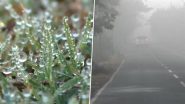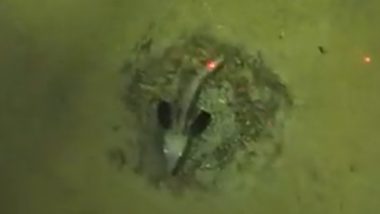In a unique observation a team of scientists recently discovered the world’s largest fish breeding area near the Filchner Ice Shelf in the south of the Antarctic Weddell Sea. The colony consists of around 60 million icefish nests. The specialty of icefish is that it is a type of fish which has a see-through skull and transparent blood. As per the sources, icefish are the only fish which do not have red blood cells. The fish nests in the Weddell Sea are concentrated in a 92-square-mile area, sometimes they are two per square metre. Each nest contains on an average 1735 eggs. Scientists Discover Supergiant Planet 10 Times Bigger Than Jupiter That Shouldn't Exist
The breeding colony was discovered in February 2021 by the German polar research vessel Polarstern, which was surveying the seabed about half a kilometer below the ship. It used a car-sized camera system attached to the stern of the ship that transmits pictures up to the deck as it's being towed.
The expedition was focused on ocean currents and the discovery of the nests, made distinct from the muddy seabed by a circle of stones, was a surprise.
We just saw fish nest after fish nest for the whole four hours, and during that time we covered maybe six kilometers (3.7 miles) of the sea floor," said Autun Purser, a postdoctoral reseacher at the Alfred Wegener Institute in Bremerhaven, Germany. He's the lead author of a study on the icefish colony that published in the journal Current Biology on Thursday.
"I'd never seen anything like it in 15 years of being an ocean scientist," Purser said. "After that dive, we emailed the experts on shore who know about fish like this. They said, yep, this is pretty unique.
The fish appear to be attracted by an area of warmer water, which is around 2 degrees Celsius warmer than the surrounding sea bed, which is a chilly 0 degrees Celsius, said Purser. Millipede With 1,306 Legs, Discovered in Australia, is The World’s Leggiest Creature
The researchers have deployed two camera systems to monitor the icefish nests until a research vessel returns. The hope is that photographs will catch more details about the fish nest ecosystem.
(The above story first appeared on LatestLY on Jan 15, 2022 05:14 PM IST. For more news and updates on politics, world, sports, entertainment and lifestyle, log on to our website latestly.com).













 Quickly
Quickly





















